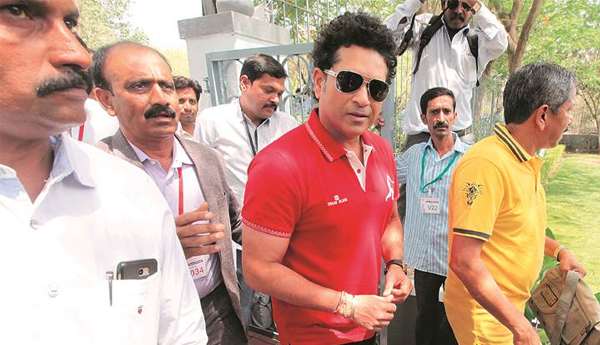Where Are the Sports Grounds, Laments Sachin Tendulkar
“Sports grounds are becoming so rare, wherever there is free space, something is coming up. They should be considered as heritage,” said Bharat Ratna and former cricketer Sachin Tendulkar, who was at Savitribai Phule Pune University on Monday to launch “Mission Young & Fit India”.
Tendulkar, who was being interviewed by renowned sports reviewer Sunandan Lele about the paucity of sports grounds and what he felt about it, agreed grounds had indeed become few and getting fewer by the day. “Many times I see that we have constraints of space. Many grounds are not being used and even if they (schools) are using them, they are not allowing others to use. I think the policy should be, you also use and allow other schools to use,” he said.
Tendulkar recalled how for international matches also, the team had sometimes prepared without adequate facilities. “Until 2006 I think, indoor nets were not ready. I remember this series with Australia, everywhere it was raining. There was no chance to practice. So I padded up and went to play on this ground, which was full of muck. Even before the ball came on, the dirt used to fly in my face. But it was fun, kind of reliving our childhood days. Unfortunately today, grounds are not being used much,” said the master blaster.
Lele spoke about the lifestyle changes that have come about today compared to the past when parents would reprimand children for playing on the field for too long vis-a-vis today when they have to push children to play physical sports. “It is a dangerous change. Even communication is getting lesser while people may not realise it. Sometimes I feel when technology wasn’t there, it was better. Life was stress-free. Outdoor activity or any sport teaches you a lot in life,” he said.
Speaking about the lessons he learnt from sports, Tendulkar, who said he was attending the event as a sportsman and not as a cricketer, said sports had taught him teamwork and selflessness by keeping the team above personal ambitions. “The most important lesson I learnt from sports was never taking shortcuts. I remember my first match, I had scored 24 runs. At that time, only if you scored 30 runs and above, your name came in the newspapers. I didn’t know and when someone advised, we changed the runs. The next day my coach took me aside and asked me, how much did you score and I told him the truth. He told me that if you want to see your name in the papers, do it on your own merit and the satisfaction will be something else. Sports taught me to get back on my feet again and compete in the most competitive manner,” he said.
On being told that Savitribai Phule Pune University had made sports an integral part of the curriculum for all first-year undergraduate students, he applauded the step. “I see in trial matches, certain selectors are doing only a formality. In that, many talented kids get ignored. Our structure needs to be formalised and that will make the process more responsible. If sports is taken as a formal subject in universities, then it will be taken more seriously,” said Tendulkar.
He added that grading system should be followed by all universities and schools, where students should be given impetus for performing at district-, state- or national-level events by giving them extra marks in academics, based on performance.
Over 250 management representatives and sports teachers were present at the event and Tendulkar urged them to play a more pro-active role in promoting sports on campus. “All parents are not supportive. That’s why sports teachers play an important role. Students trust them, they share a bonding. That’s why the message being delivered through them becomes critical. Also once a sportsman, always a sportsman. There are many retired sportspersons who are on desk jobs, passing files from one table to another, employed in schools and colleges. It is not good to waste their experience,” he said.
Courtesy : indianexpress


